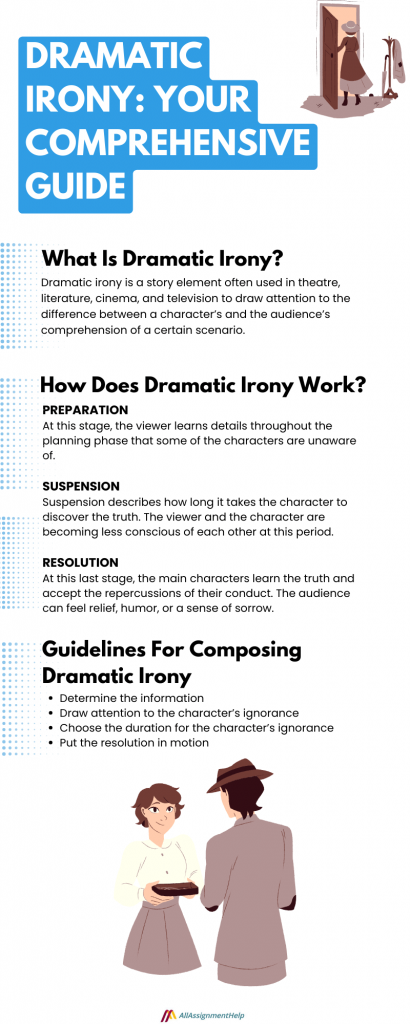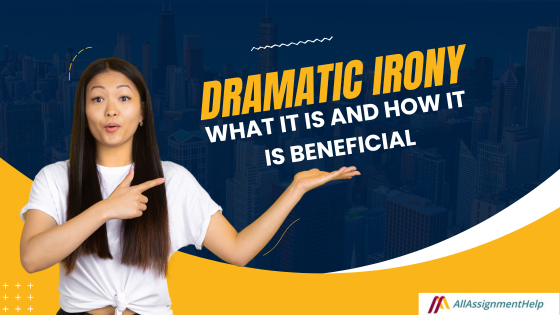Table of Contents
There are many strategies writers can use to keep readers interested and involved as the plot thickens and the narrative progresses. One of the most commonly used techniques is dramatic irony. In writing, dramatic irony can add contrast, suspense, and tension. It can also be used for comedic effect by revealing a joke to the readers. A strong understanding of irony in drama can give a writer or filmmaker extensive force. However, what exactly is dramatic irony and how does it work? Don’t worry! We will tell you everything you need to know about this type of irony. In this blog post presented by AllAssignmentHelp, we will define dramatic irony and how it works. We will also give you some examples for your clear understanding so that you can understand how to use dramatic irony in your writing.
So, let’s get started!
What Is Dramatic Irony?
Dramatic irony is a story element often used in theatre, literature, cinema, and television to draw attention to the difference between a character’s and the audience’s comprehension of a certain scenario. To be more precise, in dramatic irony, the character or characters to whom the information relates are “in the dark”—that is, they do not yet possess the same knowledge as the audience—while the reader or audience is aware of some crucial information. A simple illustration of this would be any horror movie scenario where the viewer might yell, “Don’t go in there!” as, even though the character doesn’t suspect anything, the viewer already knows what will happen to them.
Key Details About Dramatic Irony
- The reason this kind of irony is referred to as “dramatic” is not because it is tragic or over the top, but rather because it has its roots in classical Greek theatre.
- It is especially suited for the stage because the audience remains in one spot and is always guaranteed to have a more comprehensive understanding of the story than any one character does.
- This was a common device in tragedies and was used by classical theatre to generate a sense of tension. Additionally, it has a powerful comedic effect. Thus, it’s a common tactic in contemporary television and film to get viewers laughing.
- Over the past twenty years or more, the word “irony” has gained use to characterize a detached attitude or mischievous comedy. Hence, the literary device of dramatic irony is the subject of this entry.
Read Here: Verbal Irony: Meaning and Significance in Literature

How Does Dramatic Irony Work?
Dramatic irony is divided into three stages i.e. preparation, suspension, and resolution. Let’s know about each of them in more detail.
Preparation
At this stage, the viewer learns details throughout the planning phase that some of the characters are unaware of. The reader is aware that Juliet’s “poison” in Romeo and Juliet is an elixir that will give the impression that she is dead. Fortunately, this is discreetly revealed to the reader, none of the other characters—especially Romeo—know this. However, if you are assigned to write a dramatic irony play or writing, you could face problems at the preparation stage. This is where we suggest you hire an assignment helper online so that you can prepare effectively.
Suspension
Suspension describes how long it takes the character to discover the truth. The viewer and the character are becoming less conscious of each other at this period. The oncoming miscommunications and repercussions that the character is blind to are readily apparent to the viewer. The tension rises slowly at first. There is more suspense for the spectator the longer the dramatic irony is maintained. For example, Oedipus, in Sophocles’ Oedipus Rex, is eager to learn the truth about his ancestry and the reason behind Thebes’ scourge. However, the audience is aware that Oedipus is the reason for the plague because Oedipus killed his father and wed his mother.
Resolution
At this last stage, the main characters learn the truth and accept the repercussions of their conduct. The audience can feel relief, humor, or a sense of sorrow, depending on the genre. Also, dramatic tension is relieved at this point. For example, Dramatic irony is the foundation of the movie The Truman Show: although Truman is unaware, the viewer is aware that he is the star of a reality TV program. However, the story comes to an end when Truman learns the truth and chooses to leave the made-up village where he had spent his entire life.
Guidelines For Composing Dramatic Irony
You can compose and give structure to your dramatic irony writing by following the guidelines listed below.
Determine the information
Determine the information that the reader must be aware of. Moreover, this information should represent a major conflict in the narrative since the reader will be carrying it with them the entire time.
Draw attention to the character’s ignorance
Point out the ignorance of the character. Prove to the reader that you are aware of information that the character is not. This can be demonstrated by conversation, actions, or by putting them in an environment where their expertise would be useful. Furthermore, the dramatic irony can be incorporated into one or two sentences. It doesn’t have to be complex.
Choose the duration for the character’s ignorance
Choose how long you want to hide information from the character. The stakes rise with the length of time the matter persists. You can create a lesson plan assignment to determine the duration so that it engages the viewers in your plot.
Put the resolution in motion
Set the resolution in motion. Characters can learn the truth in a lot of ways throughout the narrative. Therefore, be sure your scene conveys the desired impact. Avoid harming your characters to fix the situation if you want it to be humorous (unless you are going for dark humor). On the other hand, do not allow a small miscommunication to undo the dramatic irony if the intended outcome of your story is a tragedy.
You can learn how to compose a dramatic irony by enrolling yourself in online English classes. They are the best source where you can learn every little information about this type of irony. Also, you can ask someone to take your online English class for you for further assistance.
Also Read: Different Types of Poetic Devices with Examples
Examples of Dramatic Irony
Dramatic irony is used in a variety of storytelling formats, such as movies, books, and theatre. Here are the examples listed below that will give you a clear glimpse and increase your understanding more for this type of writing irony.
Macbeth by William Shakespeare
“There’s no art
To find the mind’s construction in the face:
He was a gentleman on whom I built
An absolute trust.”
This is one of the best examples of dramatic irony. Here, Duncan expresses his belief in Macbeth, claiming ignorance of the witches’ prophecy that Macbeth would become king and murder him. However, the prediction is known to the audience. This demonstrates dramatic irony.
Romeo and Juliet
“Ah, Juliet, / Why do you still look so pretty? Will I think that this insignificant death is romantic and that this thin, hated monster is keeping you here in the dark to be his paramour? If so, I still intend to stay with you, and I will never leave this castle of night again.
There is a lot of dramatic irony in these lines from Act 5, scene III. Romeo believes Juliet is dead as he stands in front of her lifeless body. However, the audience knows that Juliet is faking her death by taking a sleeping potion. Romeo’s observation of Juliet’s beauty and seeming lack of death heightens the scene’s emotional impact and dramatic irony.
Othello by William Shakespeare
“Othello: I think thou dost.
And for I know thou ‘rt full of love and honesty
And weigh’st thy words before thou giv’st them breath…”
Another excellent example of theatrical irony is when Iago deceives Othello and Othello believes Iago to be a good man. However, he is unaware that Iago is scheming to harm him. Once more, Othello is unaware that Iago is lying, but the audience is.
A Doll’s House by Henrik Ibsen
“To be able to play and run around with the kids, to be able to maintain the house immaculately, and to have everything just how Torvald wants it—to be free from care, quite free from care!”
With excitement, Nora awaits the time when she will be able to settle her debts to Krogstad. This indicates that she would have freedom. However, by the time the reader realizes that her freedom is bondage—as she does at the end of the story—her speech demonstrates the use of dramatic irony.
Three’s Company
The central joke of the vintage sitcom Three’s Company, which follows a man who lives with two women under the watching eye of their landlord. The roommates lie and claim the man is gay to persuade their landlord that the arrangement is OK. Even though there is a significant deal of love tension between the three of them. The conflict between the audience’s understanding of this secret and the landlord’s ignorance forms the basis of the laughter in almost every episode.
As you can see in the examples above, some of them contain a little philosophy as well. Hence, to make your dramatic irony more effective, you can learn about the philosophical concepts and terms that can be used in irony. You can also take an online philosophy class that fulfills your requirements. Furthermore, hiring an expert whom you can ask, please take my online philosophy class for me will add the cherry on the cake. The expert will help you make the most of your class by giving you insightful ideas and information related to the usage of philosophical terms in the drama of irony.
FAQs
| What does tragic irony mean in dramatic irony? Tragic irony occurs when a character’s ignorance has tragic or deadly results, but the audience is aware of information that one of the characters is not. There are situations when the terrible conclusion is shown to the viewers right away. |
| Why do writers use dramatic irony? It is used by writers for many different things. It is a very useful structural device in both tragedies and comedies; it can build tension or sharpen the emotional appeal of a tale, but it can also result in a string of comical miscommunications. |
| Which example of dramatic irony is the best? The apple that the witch gave Snow White was poisoned and cursed, as the audience is aware when she eats it. We are left with no choice but to watch helplessly as she takes a bite and falls into a never-ending sleep. |
